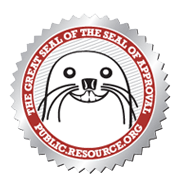5 mrt 2024
Kopieer citeerwijze ||
Public.Resource.Org Inc en Right to Know CLG tegen de Europese Commissie
Europese Commissie kan toegang tot EU-wetgeving niet blokkeren

HvJ EU 5 maart 2024, IEF 22157, IT 4587, IEB 3762; ECLI:EU:C:2024:201 (Public.Resource.Org Inc en Right to Know CLG tegen de Europese Commissie). Eisers in deze procedure zijn Public.Resource.Org Inc en Right to Know CLG, twee non-profitorganisaties wiens focus het is om de wet vrij toegankelijk te maken voor alle burgers. Op 25 september 2018 hebben zij in dit kader een verzoek gedaan aan de Europese Commissie (hierna: de Commissie) om toegang tot bepaalde documenten te verkrijgen, in het bijzonder vier geharmoniseerde normen zoals die zijn opgesteld door het Europese Comité voor Standaardisatie (hierna: CEN). De Commissie heeft dit verzoek afgewezen. Op 30 november 2018 hebben eisers gevraagd om een herbeoordeling, maar de Commissie kwam tot hetzelfde besluit. Op 28 maart 2019 zijn eisers daartegen in beroep gegaan bij het Gerecht van de EU. Zij voerden enerzijds aan dat de Commissie onterecht heeft aangenomen dat de documenten vatbaar zijn voor auteursrechtelijke bescherming, alsmede dat niet aannemelijk is gemaakt dat publicatie van de documenten de commerciële belangen van CEN zou schaden; anderzijds stelden zij dat de Commissie heeft miskend dat er een zwaarwegend publiek belang is bij de toegang tot de documenten. Het Gerecht heeft beide argumenten ontkracht en het beroep ongegrond verklaard. Daarop hebben eisers besloten in hoger beroep te gaan bij het Hof van Justitie van de Europese Unie (hierna: Hof), om daar alsnog hun gelijk te krijgen.
Het Hof stelt voorop dat iedere burger in de EU het recht heeft op toegang tot de documenten van de instellingen, organen, diensten en agentschappen van de Unie, voor zover daarmee niet de commerciële belangen, inclusief die van auteursrechtelijke aard, van een natuurlijke persoon of rechtspersoon worden ondermijnd. Een dergelijke voorwaarde geldt niet in het geval er sprake is van een overheersend publiek belang. Het Hof stelt voorts vast dat de geharmoniseerde normen als EU-wetgeving kunnen worden aangemerkt, waaraan economische actoren binnen de EU moeten voldoen. Mede gelet op de principes van transparantie en openheid, brengt dit mee dat er een overheersend publiek belang is bij de toegang tot die wetgeving. De vordering van eisers moet dan ook alleen hierdoor al worden toegewezen. Een nadere bespreking van de eerste aangevoerde grond laat het Hof dan ook achterwege.
70 In that regard, it should, in the first place, be recalled that the Court has already held that a harmonised standard, adopted on the basis of a directive and the references to which have been published in the Official Journal of the European Union, forms part of EU law owing to its legal effects (see, to that effect, judgment of 27 October 2016, James Elliott Construction, C‑613/14, EU:C:2016:821, paragraph 40).
81 In the second place, as the Advocate General noted in point 52 of her Opinion, Article 2 TEU provides that the European Union is based on the principle of the rule of law, which requires free access to EU law for all natural or legal persons of the European Union, and that individuals must be able to ascertain unequivocally what their rights and obligations are (judgment of 22 February 2022, Stichting Rookpreventie Jeugd and Others, C‑160/20, EU:C:2022:101, paragraph 41 and the case-law cited). That free access must in particular enable any person whom legislation seeks to protect to verify, within the limits permitted by law, that the persons to whom the rules laid down by that law are addressed actually comply with those rules.
83 In the third place, it must be recalled that the principle of transparency is inextricably linked to the principle of openness, which is enshrined in the second paragraph of Article 1 and Article 10(3) TEU, in Article 15(1) and Article 298(1) TFEU and in Article 42 of the Charter. It makes it possible, inter alia, to ensure that the administration enjoys greater legitimacy and is more effective and more accountable to the citizen in a democratic system (see, to that effect, judgment of 22 February 2022, Stichting Rookpreventie Jeugd and Others, C‑160/20, EU:C:2022:101, paragraph 35 and the case-law cited).
85 In those circumstances, it must be held that there is an overriding public interest, within the meaning of the last clause of Article 4(2) of Regulation No 1049/2001, justifying the disclosure of the requested harmonised standards.























